|
OP: Hirondelle
In July,
1953 the French conducted a major attack to destroy Viet Minh depots near
the Chinese border. A major airborne assault drop over Lang Son area
involved about 2000 paras of the 6e and 8e BPC and 2e
BEP. Much weapons and material was found and destroyed. Despite sharp
enemy response the paras withdrew successfully. They marched 50miles to
link up at GM5 pushing up RC4 (rute colonial) from Tien Yen.
|
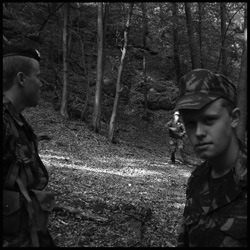 |
Sergent Bernard Saint-Pierre looks into the camera of journalist Walther
Blanc as his troops orient themselves on the ground shortly after the
jump. To the left is Luc Salam Didier and in the background Jean-Pierre
Latrine can be seen
|
 |
Bernard
Saint-Pierre confers with the group’s scout, while Jean-Pierre enjoys a
pipe during this break.
|
 |
The Viet Minh used both regular depots such as warehouses, farms and
houses, but also utilized what nature had to offer such as mountains and
caves. The latter were very practical since it was difficult for the
French airforce to find and it was almost impossible for them to destroy
them because of the difficult terrain.
Here, soldiers scout through the terrain, looking for signs of Viet Minh
activity.
|
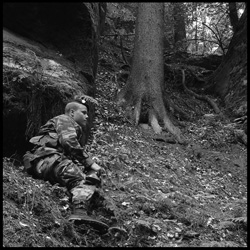 |
Even though the Viet Minh were taken by surprise during the operation,
they offered a strong resistence. Here, Luc Salam Didier takes cover from
hostile shooters. |
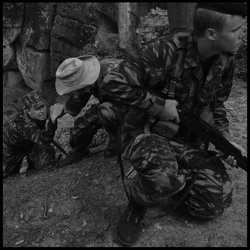 |
The Viet Minh depot defenders were no front units, and mostly consisted of
militia, trainees and some elders. Even though they fought hard they were
against overwhelming odds from “Le Para”. |
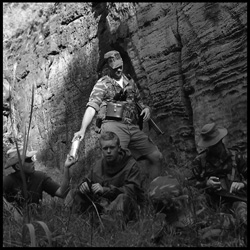 |
Troops from the 6e BPC rest after a fire fight. The soldiers immediately
look over their firearms when they have the chance, cleaning and oiling
them so that they don’t click in a fire fight.
From left to right is Luc Salam Didier, Micque Traminere, Leopold Tanguie
and Vermont Chavalier. The soldier lying in the grass is Jean-Pierre
Latrine. |
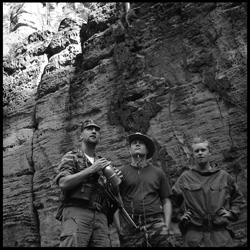 |
The weapons cashe which was the target lay along this gulch, but since the
enemy constantly lay in ambush in the narrow passage the group decided to
go around the enemy over a cliff. Here Micque speaks with Luc which way
they should use for climbing.
|
 |
Vermont Chavalier guards with his American M1 Garand as Traminere uses his
binoculars to scout for signs of enemy presence. In the background Didier
can be seen inspecting a insect bite on Latrine.
|
 |
Soldiers embark on a climb up into the mountain pass. |
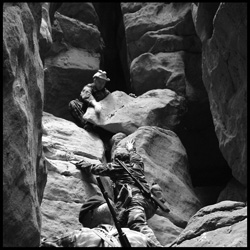 |
Climbing up inside the mountain. The soft rock is soft enough to be
deformed by nature and natural caves and tunnels are often formed inside
it. |
 |
Latrine helps a soldier move from one platform to another.
|
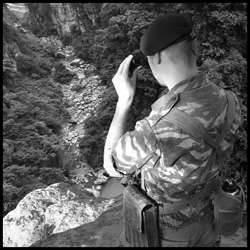 |
Overlooking the valley and entrance to the weapons depot located in a
cave. From here the enemy’s position could be overlooked and air support
called in to decimate the enemy’s strength.
|
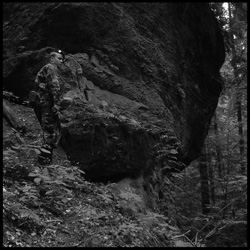 |
With half the group left on the top as fire support the other half of the
group advance down towards the cave entrance. |
|
|
|
 |
Bernard Saint-Pierre moving trough the jungle with his M1A1 Thomspon Sub
Machine Gun.
|
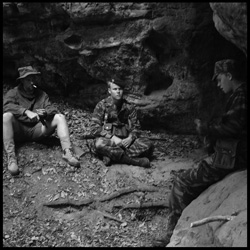 |
Outside the entrance to a weapons depot. In this cache a large quantity of
artillery grenades of French and Chinese origin were found. Here Bernard
Saint-Pierre prepares to destroy the ammunition with a satchel charge.
|
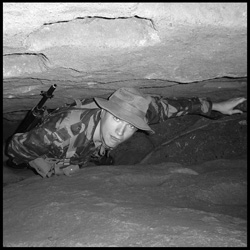 |
Vermont Chavalier presses himself through a tight passage with his bulky
American rifle on his back.
|
 |
Didier exploring a smaller cave.
|
 |
A possible cache is inspected and searched.
As stated before, nature generates differences in cliffs such as these.
|
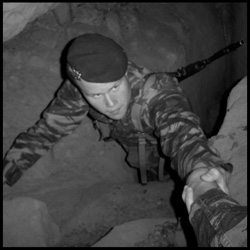 |
Searching another cave,
Didier is helped up by a soldier.
|
 |
The group heads back towards the DeLattre line along CR4.
|
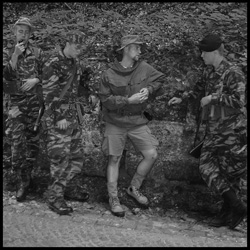 |
Taking a short break in a slope along CR4.
Latrine relaxes with his pipe as the scout and Didier are engaged in a
discussion.
|
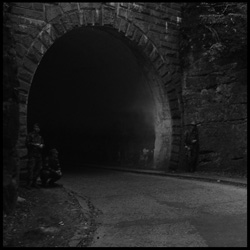 |
CR4 passes through a mountainous area. Here the group stands outside one
of the many tunnels that are located along the road. |
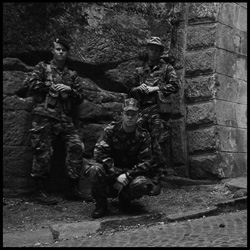 |
Group members pose before the
journalist’s
camera shortly after linking up with French forces from GM5.
From left to right; Luc Salam Didier, Bernard Saint-Pierre and Jean-Pierre
Latrine.
|
|
|
|
|
|
|
